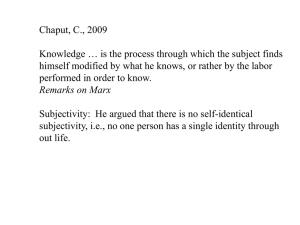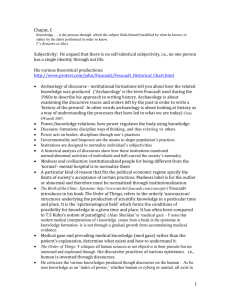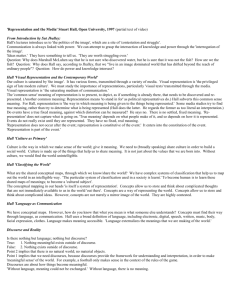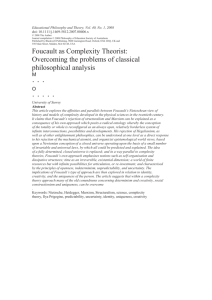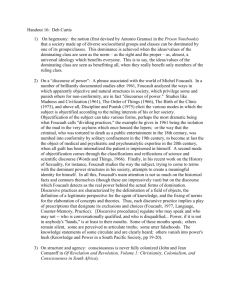Methodological approach
advertisement
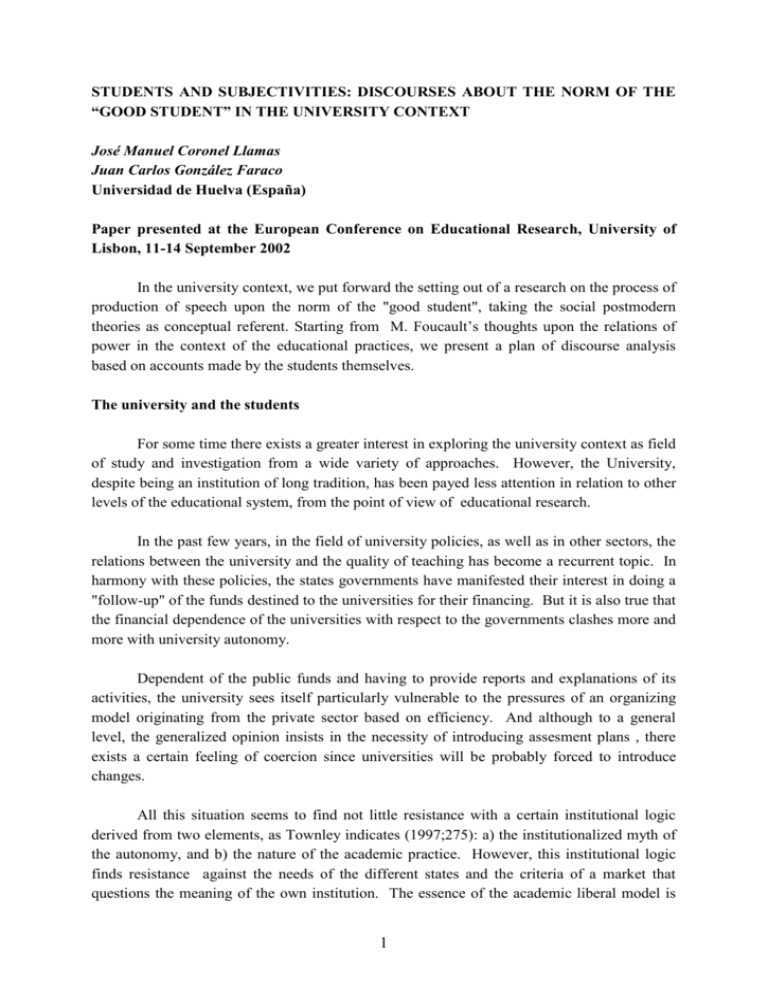
STUDENTS AND SUBJECTIVITIES: DISCOURSES ABOUT THE NORM OF THE “GOOD STUDENT” IN THE UNIVERSITY CONTEXT José Manuel Coronel Llamas Juan Carlos González Faraco Universidad de Huelva (España) Paper presented at the European Conference on Educational Research, University of Lisbon, 11-14 September 2002 In the university context, we put forward the setting out of a research on the process of production of speech upon the norm of the "good student", taking the social postmodern theories as conceptual referent. Starting from M. Foucault’s thoughts upon the relations of power in the context of the educational practices, we present a plan of discourse analysis based on accounts made by the students themselves. The university and the students For some time there exists a greater interest in exploring the university context as field of study and investigation from a wide variety of approaches. However, the University, despite being an institution of long tradition, has been payed less attention in relation to other levels of the educational system, from the point of view of educational research. In the past few years, in the field of university policies, as well as in other sectors, the relations between the university and the quality of teaching has become a recurrent topic. In harmony with these policies, the states governments have manifested their interest in doing a "follow-up" of the funds destined to the universities for their financing. But it is also true that the financial dependence of the universities with respect to the governments clashes more and more with university autonomy. Dependent of the public funds and having to provide reports and explanations of its activities, the university sees itself particularly vulnerable to the pressures of an organizing model originating from the private sector based on efficiency. And although to a general level, the generalized opinion insists in the necessity of introducing assesment plans , there exists a certain feeling of coercion since universities will be probably forced to introduce changes. All this situation seems to find not little resistance with a certain institutional logic derived from two elements, as Townley indicates (1997;275): a) the institutionalized myth of the autonomy, and b) the nature of the academic practice. However, this institutional logic finds resistance against the needs of the different states and the criteria of a market that questions the meaning of the own institution. The essence of the academic liberal model is 1 the development of the student as person or citizen and not so much as consumer or potential worker. This commercialization of the universities is substituting the ideal of the student as a cultivated person for the model of the student endowed with abilities and prepared for working. This work tries to explore how the university conceives the idea of "good student" and the standardizing tendencies that they impose, reflected in the accounts made by the university students themselves. We are interested in knowing how the structures are influenced by the cultural influences, but above all, how the students are affected by a network of values, norms, rules, opinions, thus increasing the probability that certain behaviours appear. Nevertheless, once inside the institution, our intention is to analyze the causes and consequences of the conformity, the way in which the students are trapped by the institutional logic, and how the "norm" of the good student, imposed by the institution, is introduced in their bodies and minds, in what way the University intervenes in the construction of its identities as subjects and "produces" students adapted and in agreement with the norm. But it is also true that the spaces for the action, the opposition and the resistance will have to be as well the object of research and permanent exploration. The social postmodern theories and Foucault’s view of the students in the university. The intention of this work is therefore, to explore the production of the discourse on the "good student" in the bosom of determined university policies which imply the students, the professors and the institution as such. This involves seeking an orientation for the most sensitive research by the qualitative aspects of the students’ experiences (Ninnes, 1999; McCabe, Trevino and Butterfield, 1999; Rau and Durand, 2000; Grant, 1997). The impact of the educational institutions, and in particular the university, in the identity formation processes seems to be evident. In this case, our intention is to approach the experiences and practices of the university students from the point of view of the construction of their identities in the bosom of some determined relations of power. Purposes of this nature lead, sooner or later, to a theoretical framework constituted especially by the knowledge which the postmodern social theories provide. In order to center a little more this question, in Popkewitz and Brenan’s opinion (1998) a contribution of the postmodern social theories has been that of questioning the ways in which power acts through discursive practices and educational activities and that of exploring how the discursive spaces have been built and the way they function as systems of reclusion and confinement. Popkewitz and Brenan (1998; 293) use the term "social epistemology" as a strategy directed to substitute the objects constituted by the schooling 2 knowledge inside historically configured patterns and relations of power in an effort of understanding the conditions in which knowledge is produced. In this way, when the students speak about the exams, we should consider that their words and terms are not exclusive. When we speak of the "educated subject", of the "good student" we cannot forget that these expressions are produced in a context which has determined "ways of reasoning" at its disposition. These ways of reasoning are the ones we are interested in knowing, the principles through which the knowledge in itself is structured. These rules of reasoning give form and structure our actions, situating the subject in a complex intersection of forces and discursive practices. We justify the reference to M. Foucault inasmuch as this author helps us in the task of suspending the validity of some of the great commonplaces constituting a given domain, so that he permits the lighting of, until this moment, obscure spaces and at the same time the creation of a different conceptual framework by means of differentiated analyses and spaces of dispersion which substitute the uniform simplicities (" this is very clear"), the little thought and credible oppositions (clever/clumsy, good/evil), the totalizing comprehensions (¡we work this way here!) by a play of dependences. There are many factors to puzzle out starting from lower sources and subordinated knowledge which play havoc with the ideas of continuity. One must discover mistakes and accidents which attempt against the ideas of order. The search for the ancestry does not consist in a search for firm bases; on the contrary, it discovers shifting sands, fragmentary and incoherent facts with defects, errors, omissions, faulty assessments and affirmations, and pious aspirations. The idea is, in general, showing that the "historic truths" rest upon a fragile, contingent, and complex land" (Marschall, 1993;22-23). Foucault invites us to penetrate in this marshy land with shifting sands, open to innumerable surprises but, at the same time, well articulated and organized and that, without doubt, intervenes in the process of construction of the students as subjects. Subjectivity is a central point in the analysis of the functioning of the University as institution, a subjectivity narrowly linked to the practices of power –knowledge as far as the condition of being a subject is produced by particular discourses and practices. Methodological approach We are interested, in particular, in knowing what norms, models and systems of ideas construct what is a "good student". In what way the university constructs, develops and regulates, using practices and techniques, the idea of the "good student". The task does not rest so much on investigating who is successful or fails as student in the university, but the systems of reasoning incorporated in our ways of speaking about success or failure, about the "good" or "bad" student. To study the systems of reasoning drives us to the analysis of the 3 discourses used by the students to characterize the idea of the good student. The discourses involve a meaning and certain social relations; they construct the subjectivity as well as the relations of power. The possibilities of meaning and of definition are beforehand covered by the social and institutional position of the ones who make use of them. The meanings arise from the institutional practises, from the relations of power. In the analysis of the discourses, the question is why, at a certain moment, among all the things which could be told, they only tell some. The educational institutions control the access of the individuals to the different types of discourse. Which are the discourses they use? what do they speak about , and what do they hide? It is, therefore, an exploration in the pedagogical discourses which they use as members of a university community to characterize to the good student, discourses, on the other hand-, historically built and that, in a way, reflect the view we have of education, teaching, learning or schooling . A view assumed as natural, opinions founded on the quotidian and logical activities upon the university, the student and teaching that permit the access to the systems of reasoning. All this draw us near, as you can imagine, the analysis of the relations of power. The practices that with greater probability take us to a specific form of being of the students are the disciplinary technologies that, in spite of their rhetoric referred to the autonomy, invade the university as disciplinary block (Grant, 1997). The interesting thing of the classifications as "good student" is that they are incorporated in a discourse that functions to normalize the qualities of the people perceived as different, to produce borderlines between what is possible and what is not possible, what is inside or out of the norms. And we cannot be distracted thinking that this is only a matter of "labels" applied. "Good student" is an expression historically linked with specific systems of reasoning which differentiate and separate, which allow having an imaginary space, at last as real as the geographical one, from which to see and act upon the population of university students. We have carried out a total of 48 interviews to the same number of students of the University of Huelva1, coming from 9 different university degrees. We take as reference Gore’s research (1994), since it represents an example of use of Foucault’s perspective in the micro level analysis of the pedagogical practices and the relations of power, and its functioning in different educational contexts. Some of the techniques used by this author are employed with the purpose of organizing the data originating from the interviews. The categories that have been used for the analysis of the data are the ones that are defined immediately after: 4 The University of Huelva, situated in the Autonomous Community of Andalucía was created in 1993. Nowadays it is formed by a population of 13.000 students, 700 professors and 32 university degrees. · SURVEILLANCE: In this category, we include practices of supervision, systematic and deliberate observations, questions, and everything that involves putting in practice a system of "control" in a specific setting. · NORMALIZATION: We include in this category the realization of comparisons, invocations, requests, to mark or to conform taking a standard or model as basis. To define what is normal. · CLASSIFICATION: We include in this category the practices and mechanisms of classification destined to differentiate groups or individuals, to classify them, or to classify oneself. · DISTRIBUTION: We include in this category the practices and mechanisms for the distribution of people and groups in different spaces, to work, to have a good time.. · INDIVIDUALIZATION: We include in this category the practices and mechanisms to give individual character to oneself or to another, trying to place the I opposite to... · REGULATION: We include in this category practices and mechanisms by means of which the control by rules is exercised, is submitted to restrictions, is invoked to norms. Sanctions are imposed, rewards and punishments are given. These categories have served to organize the discussion of the results obtained and to allow a "mapmaking" of the discourse about the idea of the "good student". It is also true that the students’ accounts reflect clearly the processes, practices and mechanisms of resistance that they use. To speak of power is to speak of resistance. Both need the other to be perpetuated, leaving spaces for the opposition and the alternatives. What do the students do to act in "another way", to subvert the established order, to challenge the authority and escape from the pressure exercised?; What do they do also, in this sense, to "endure" better the "academic inclemencies"? In this work, we have been able to draw near these questions verifying the potentiality of these approaches for the analysis of a different reality and in constant creation. References BALL, Stephen J. (1993) (Comp.) Foucault y la Educación. Madrid: Morata. 5 BARLEY, S. y TOLBERT, P. (1997) Institutionalization and structuration: Studing the links between action and institution. Organization Studies, 18 (1) 93-117. BOURDIEU, Pierre y PASSERON, Jean C. (1969) Los estudiantes y la cultura. Barcelona, Labor. FOUCAULT, Michel. (1991) Saber y verdad. Madrid: La Piqueta. FOUCAULT, Michel. (1995) Un diálogo sobre el poder y otras conversaciones. Madrid: Alianza-Editorial (5ª reimp) FOUCAULT, Michel. (1996) Vigilar y castigar. Madrid: Siglo XXI (10ª ed). GARCÍA CALVO, Agustín. (1990) Desengaños acerca de universidad, enseñanza e investigación. Revista de Enseñanza Universitaria, 1 (1) 13-23. GORE, Jennifer (1994) Power and pedagogy: Within and beyond the schooling institution. Annual Conference of Australian Asocc. for Research in Education. Newcastle. GRANT, Barbara (1997) Disciplining students: the construction of student subjetivities. British Journal of Sociology of Education, 18 (1) 101 y ss. LATHER, Patti. (1992) El postmodernismo y las políticas de ilustración. Revista de Educación, 297 7-24. MARSHALL, J. (1993) Foucault y la investigación educativa. En Ball, Stephen J. (1993) (Comp.) Foucault y la Educación. Madrid: Morata 15-32. McCABE, Donald L. TREVINO, Linda K. BUTTERFIELD, Kenneth D. (1999) Academic integrity in honor code and non-honor code environments. The Journal of Higher Education, 70 (2) 211-234. NINNES, Peter. (1999) Acculturation of international students in higher education: Australia. Education and Society, 17 (1) 73-101. POPKEWITZ, Thomas S. (1998) La conquista del alma infantil. Políticas de escolarización y construcción del nuevo docente. Barcelona: Pomares. POPKEWITZ, Thomas S. y BRENNAN, Marie. (1997) Reestructuring of social and political theory: Foucault and a social epistemology of school practices. Educational Theory, 47 (3) 287-314. RAU, William y DURAND, Ann (2000) The academic ethic and college grades: Does hard work help students to "make the grade"? Sociology of Education, 73 19-38. 6 SCHEURICH, J. (1994) Social relativism: A postmodernist epistemology for educational administration. En Maxcy, S. (Ed) Postmodern school leadership. Wesport: Praeger 1746. TOWNLEY, Barbara (1997) The institutional logic of performance appraisal. Organization Studies, 18 (2) 261-285. 7
